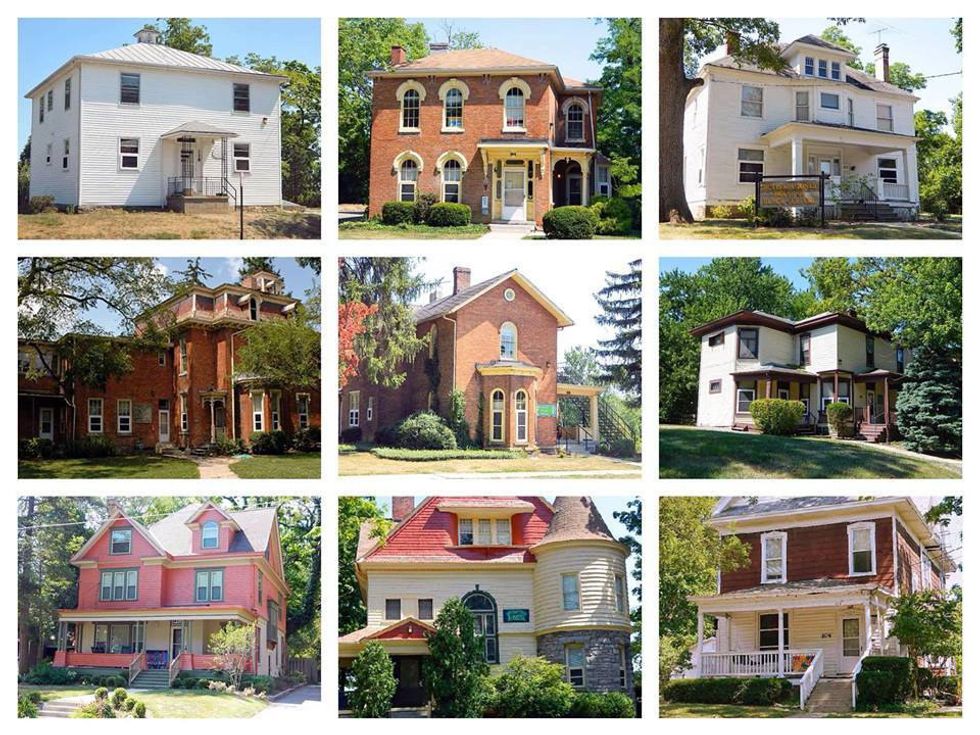There are many things that can make or break a college experience. From academics, the party scene, sports, the dynamics of your particular department, to housing and campus atmosphere. It seems like one out of every three people has a story about a terrible roommate, and there are countless articles out there about the kinds of roommate you have in college, what your roommates taught you and the endless thank you notes to roommates that we all share on Facebook and tag people we probably don't talk to all that much anymore but shared smiles with for the better part of a year.
One of the unique things about Ohio Wesleyan University is that it offers a different kind of housing. Not Greek Life housing (at least not for sororities, as the frats do have their own housing... This is due to some old Ohio law that I won't get into. The school's old.)
OWU has what students fondly call "SLU Life" otherwise known as Small Living Units.

(The picture above is slightly outdated, as three of those houses have been torn down and one is no longer a community.)
OWU is currently home to the Sexuality and Gender Equality House, the House of Peace and Justice, the House of Linguistic Diversity, the Interfaith House, the Citizens of the World House, the Treehouse, and the House of Spiritual Athletes. Other houses on campus include the House of Black Culture and the Honors House, though they go through a different selection process and are not generally counted as SLUs.
I'm not going to go into the benefits of having SLU life around for the school, because while there are many, I would run out of words and this would be an entirely different article. Instead, I'm talking about why I love my house and why I would not give it up for anything in the world.
The Sexuality and Gender Equality House is my safe haven.
I decided to SLUsh on a whim, walking over to the open houses as a plus one for a nervous friend. I didn't initially have any interest in joining a house, and I hadn't really given much thought to who I would room with the following year. But I interviewed at two houses: the Modern Foreign Language House (now the House of Linguistic Diversity) and the Women's House (now the Sexuality and Gender Equality House), and I knew I liked WoHo more, but I also knew I wouldn't be crushed if I didn't get in.
But the day I knew members of the house would be calling students to let them know they were in, my heart was racing, and I hoped I got a call.
One of the senior members of the house called me and invited me over to the house for a small celebration with the rest of the house's members. There I received a letter written by one of the current housemates that made me cry, one that I taped to my wall, and still have and proudly display.
One of the biggest fears I had after moving into SAGE a few months later was that no one would like me, no one would accept me, and everyone would just put up with me instead of believing in me. But I found a community of passionate and inspiring people who propped others up and fiercely fought for what they believed, in their own personal way.
We are not an exclusive community who only wants like-minded individuals near us. We strive to be educated and well-versed in the matters we care about and believe in, and we welcome everyone who wants or needs a safe space to learn or to be heard.
I strongly believe the reason I love my SLU so much is because we have such a strong, supportive and relatable leader in our Moderator. Lissette Gonzalez has taught me more about what it means to be a feminist and to be an ally than I could have ever imagined. She keeps our community sane and safe through hard times, she gets us through house meetings, she is the most patient and diplomatic person I know, and she is an incredible liaison between the members of the House and ResLife.
Our SLU amounts to what we are and what we represent, and we want to be a good reflection of the message our House believes in. Good people, fighting the good fight and all that mushy jazz.
What matters is not the physical house we live in, the classes we take or the jobs we take, but rather what we do with the experiences we gain because of SAGE, and what we give back to the community.






















